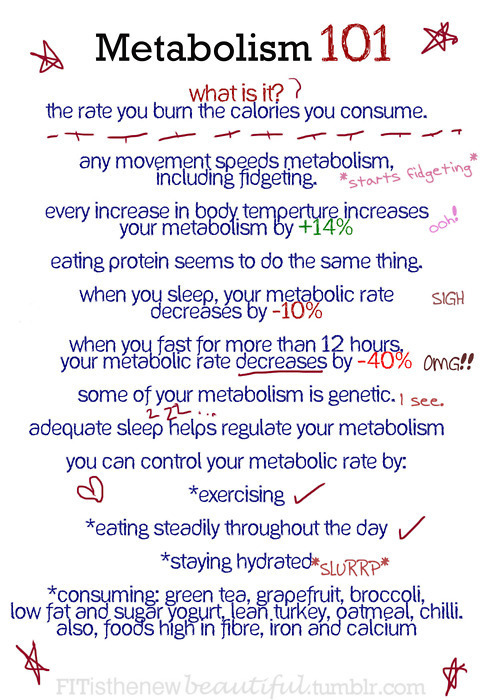This poster, spotted on Pinterest, is too good not to share.
Like many of our English words its origins are in the Greek; it sort of means "the process of throwing a change." Dictionary.Com defines it as "the sum of the physical and chemical processes in an organism by which its material substance is produced, maintained, and destroyed, and by which energy is made available."
The poster to the left is more concise. Metabolism is the rate you burn the calories you consume. Exercise really helps speed up the metabolism. More muscle mass also increases that rate. But don't forget eating right, or more specifically, eating the right stuff. During this time between Thanksgiving and New Year's Day there will be many opportunities to eat wrong. Don't give in. You can survive the holidays by following the advice on the poster. Exercise. Eat regularly (steady through the day), drink plenty of water, and eat some foods that boost your metabolism. Green tea for example.
Quit using the excuse that you were born a certain way and you're stuck with the body you don't like. Nonsense. While heredity does play a large part, you can control your metabolism a great deal more than you think. Women's Health Magazine writes
To some degree, our bodies hum along at a preset speed determined by gender and genetics, but there's still plenty of wiggle room. "You have a huge amount of control over your metabolic rate," says John Berardi, Ph.D., C.S.C.S., author of The Metabolism Advantage. "You can't affect how many calories it takes to keep your heart beating, but you can burn an extra 500 to 600 calories a day by exercising properly and eating right." And by making a few changes to your routine.
It's no surprise to me that the first tip in their article is that you should eat a good breakfast.
Another great article to read is from WebMD, which I first posted back in May this year.Titled "How To Make the Most of Your Metabolism" they make the point that while 30 minutes of aerobic exercise may burn more calories than 30 minutes of weight training, Calabrese says, "in the hours following the cessation of exercise, the weight training has a longer-lasting effect on boosting metabolism."
Having extra muscle also means you can eat more and gain less. :)
Men's Fitness Magazine takes a look at some of the claims about metabolic boosters pointing to research showing that exercise does in fact increase metabolism. So does eating six regular small meals during the day. A diet higher in protein also helps. Green tea helps, especially if you use it as a replacement for that 300 calorie Frappucino. In another article they cite research that shows that short high-intensity weight training really improves metabolic rate.
Too much information? Just remember three simple rules. Eat Right. Exercise. Get plenty of rest.
Eat Breakfast! Take a Clif Bar with you!
And if you see my son Sean today, wish him Happy Birthday!
And if you see my son Sean today, wish him Happy Birthday!
Want to read more about it? Try some of these links.


2 comments:
Doc,
Thanks for the post. Very inspiring article for a life saving change.
Take care and Happy Holiday's
Keith
Thank you, Keith, for the kind words. Hope you stop by again. Have a great holiday season.
Post a Comment